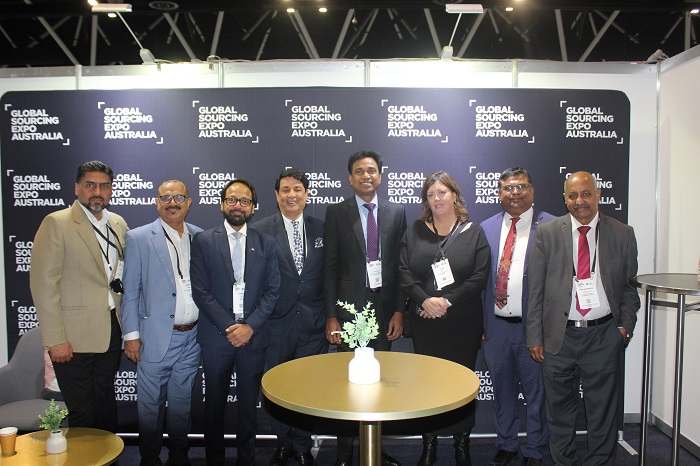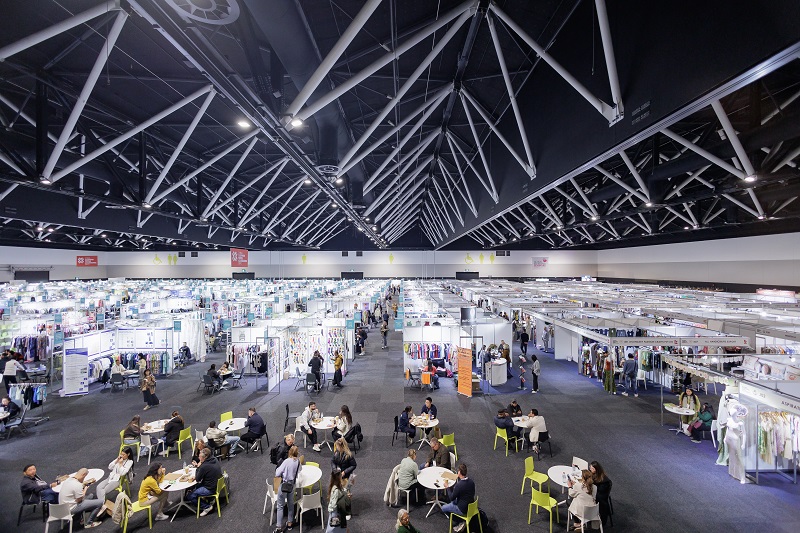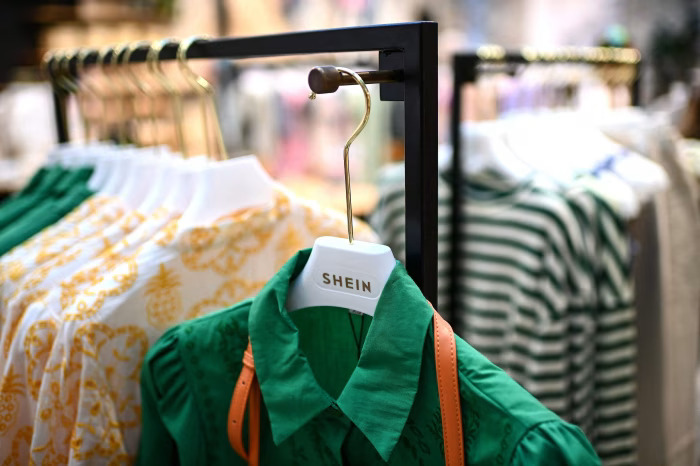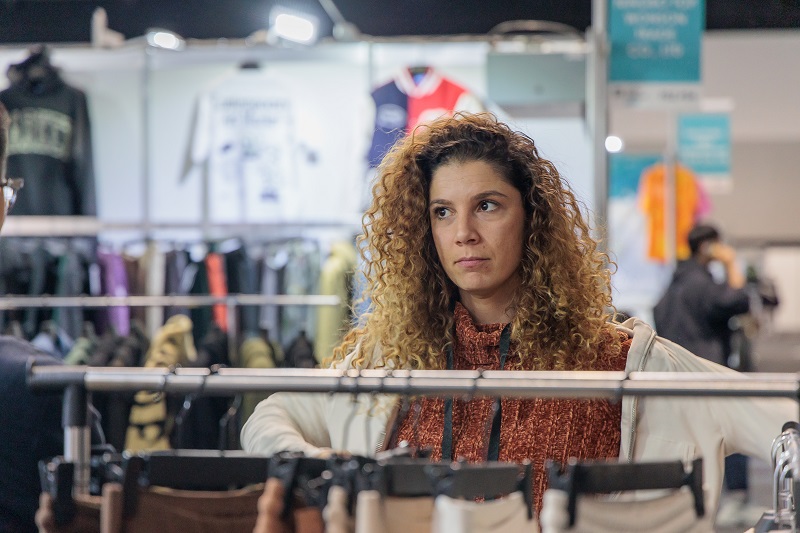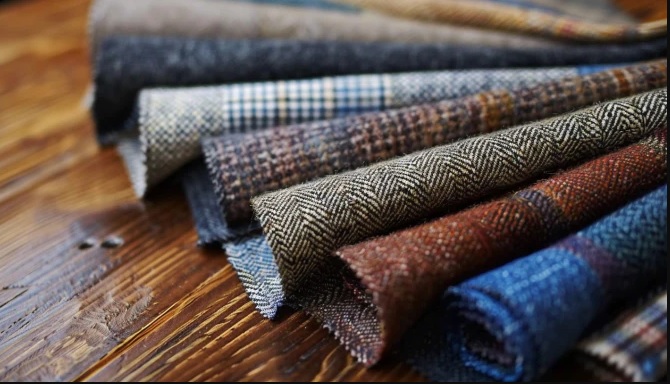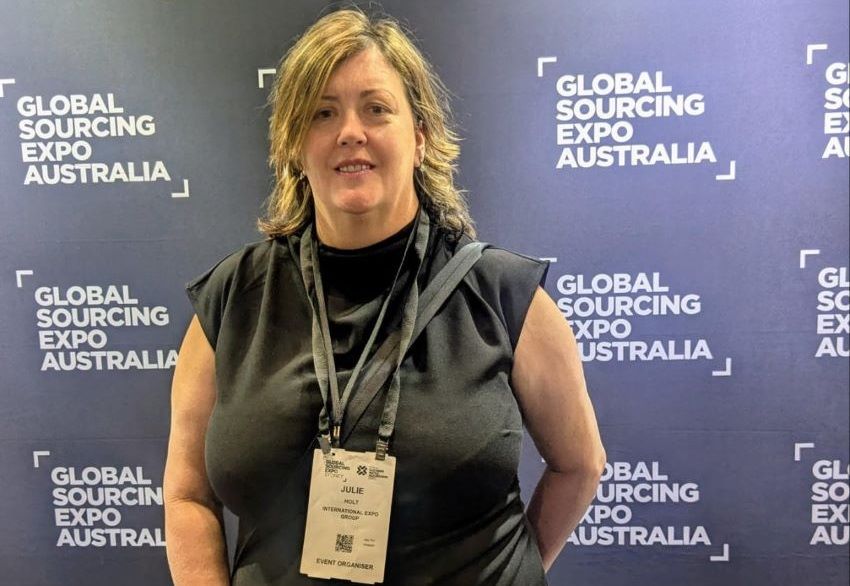FW
At ITMA ASIA + CITME 2024, Karl Mayer showcased an innovative tricot fabric in E44 for sun-protective outdoor wear, captivating attendees with its performance and versatility. The highlight was a lightweight, soft, and breathable jacket designed with UV protection over twice as effective as traditional circular knit fabrics of similar weight. This fabric’s silky feel and cool touch make it ideal for hot-weather outdoor activities.
Projected to fuel the growing sun-protective clothing market, estimated to expand by 7.9 per cent annually, reaching nearly $14 billion by 2030, the E44 fabric offers strong business potential. Produced on Karl Mayer’s high-efficiency HKS 2-S machine, the fabric yields up to 200 kg per day, showcasing both innovation and efficiency.
Textile Application Engineer Tang Qi, who designed the loose-fit jacket displayed at the show, praised the fabric’s protective and comfort-driven qualities. As an outdoor enthusiast, she tailored the jacket for mobility and breathability, ensuring it remains comfortable and non-restrictive during strenuous activities.
Karl Mayer’s E44 tricot fabric marks a significant advancement in sun-protection apparel, combining comfort with cutting-edge fabric engineering to meet rising demand in outdoor activewear.
As announced by B Susheela, Deputy Commissioner and Chairperson, District Task Force Committee, Karnataka Government, the Hubballi unit of Cotton Corporation of India (CCI) has opened cotton procurement centers in the Yadgir district under the Union Government’s Minimum Support Price (MSP) Scheme for 2024-25 to allow farmers to sell cotton at these centers.
These centers will procure only 12 quintals of cotton per acre under the scheme after inspecting its quality. They will not purchase cotton with more than 12 per cent of moisture content in it. Medium quality cotton will be purchased at Rs 7,121 per quintal while best quality cotton will get Rs 7,521 per quintal.
The procurement centers opened in the district include Soudagar Cotton Mill, Managanal village; Balaji Cotton Industries, Saidapur; R.S. Fibres, Maddarki; Manjit Cotton Mill, Gogi (K) and Aralahalli Cross; Basavajyothi Cotton and Ginning Factory, Aralahalli Cross; Basavaraj Sajjanshetty Cotton and Agro Industries, Hallisagar; Manikanth Cotton and Ginning Industries, Hulakal, and Jailaxmi Cotton Mills, etc.
The material science division of the Taiwan-headquartered Alpine Group, Paradise Textileshas launched a new lightweight jacket made from bio-based and biodegradable polyester resin developed by the New York-based Kintra Fibers. Serving as a proof-of-concept, the garment showcases the commercial potential of Kintra’s sustainable alternative to conventional fossil-based polyester.
Collaborating with Fashion for Good and other leading brands, including Bestseller, Inditex, and Reformation, over a year-long project, Kintra previously developed prototype materials using its innovative resin. The resulting yarn offers strength and durability similar to traditional polyester but with enhanced softness and inherent stretch. It also offers 10-15 per cent stretch recovery with the material beingsuccessfully integrated into different fabric types, including silk-like satin, technical outerwear wovens, and air-jet and draw-textured knits.
Kintra’s resin production reduces greenhouse gas emissions by 95 per cent, water usage by 30 er cent and energy consumption by 20 per centas compared to conventional polyester.
Known for its end-to-end fashion delivery services, Alpine Group has previously collaborated with major brands like The North Face, Sweaty Betty, American Eagle Outfitters, Under Armour, and Gap.
Lewis Shuler, Head – Innovation, Paradise Textiles, emphasises, the company seeks fiber technologies that reduce carbon footprints and offer sustainable alternatives to fossil-based synthetics. The company collaboration with Kintra will help harness its potential to create diverse textiles as Kintra’s material meets environmental standards besides delivering additional performance benefits.
Billy McCall, CEO and Co-founder, Kintra, adds, Paradise Textiles’ expertise in fabric development has been crucial in bringing Kinfra’s vision to life and this new prototype confirms the viability of the company’s material.
Knitwear exporters in Tiruppur have welcomed the spinning mills’ decision to lower cotton yarn prices across all counts by Rs 10 per kg. For instance, spinning mills in the city have lowered the the price of 20s kh (18.5 count) to Rs 210 per kg from the earlier Rs 220 per kg. Similarly, the price of 40s kh (38.5 count) yarn has been lowered to Rs 238 per kg from the earlier Rs 248 per kg.
Knitwear exporters hailed this move as a boost to both domestic production and exports, especially ahead of the New Year and Christmas season. They have been receiving increasing orders, bringing optimism about meeting export targets.
KM Subramanian, President, Tiruppur Exporters’ Association, states, the reduction in cotton yarn prices will help boost domestic production and exports, especially with cotton prices declining to Rs 56,000 per candy. This will enable exporters achieve their target of Rs 40,000 crore exports this year.
MP Muthurathinam, President, Tiruppur Exporters and Manufacturers Association, adds, besides, orders for New Year and Christmas, exporters are also receiving inquiries from Bangladesh. The recent price reduction will help exporters bag more orders.
While domestic sales were promising in the lead-up to Deepavali, overall demand fell short of expectations afterward. However, supported by the current decrease in yarn prices, export orders for Christmas and New Yearare likely to improve, he adds.
According to industry sources, this is the third price cut in 2024 after a reduction by Rs 20 per kg in Jan’24 and again by Rs 20 per kg in June’24.
From Jan-Oct’24, Turkiye’s textile exports to Azerbaijan declined by 1.1 per cent to $41.3 million as compared to the same period in 2023, as per a report by ABCAZ.
However, despite an overall decline, Türkiye's textile exports to Azerbaijan grew by 15.1 per cent to $5.5 million in Oct’24compared to October 2023, as per the report citing data from Turkish’s Ministry of Trade.
On a broader scale, Türkiye's total textile exports from Jan-Oct’24 declined by 1.6 per cent Y-o-Y to $7.8 billion. However, exports in Oct’24 increased by 0.4 per cent to $842 million as against exports in Oct’23.
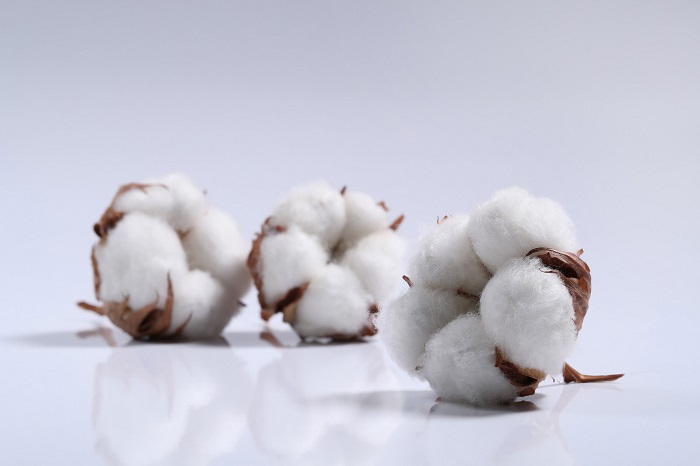
Five Indian cotton companies have been banned by the Global Organic Textile Standard (GOTS) for falsifying documents and engaging in fraudulent practices to obtain organic certification. This incident has once again cast a shadow over the credibility of organic certifications, particularly in India, which has faced scrutiny for a history of fraudulent organic cotton claims.
The banned companies, two based in Odisha and three in Gujarat, employed tactics such as using fictitious shipping companies and submitting forged transaction certificates to deceive the GOTS certification system. In some cases, the companies even created fake websites to support their fraudulent claims. These actions undermine the integrity of the organic cotton supply chain and erode consumer trust in organic products.
As per investigations, there was no material transfer and the shipping company was nonexistent," GOTS stated on its website. In some cases, forged National Organic Program (NOP) transaction certificates with QR codes linking to fake websites were used. This incident is not isolated one. In September, GOTS banned four other Indian companies for similar fraudulent activities, including stock manipulation and overselling. This pattern of deception raises serious concerns about the integrity of the organic cotton supply chain and the effectiveness of certification processes.
A dubious history
The organic cotton industry has long been plagued by fraud and dubious certifications issues. While demand for organic cotton has grown significantly due to growing consumer demand for sustainable and ethical products, the supply chain has struggled to keep pace with verifiable organic farming practices. "The organic cotton sector has a history of over-claiming production," says Liam Olive, an activist involved in investigating the recent case. "This latest incident highlights the ongoing challenge of ensuring authenticity and transparency in the supply chain."
One major issue is the supply chain complexity. Organic cotton often passes through multiple intermediaries – farmers, ginners, spinners, and traders – before reaching the final manufacturer. This creates opportunities for fraudulent activities, such as mixing conventional cotton with organic cotton or falsifying documents. India, in particular, has faced scrutiny regarding the authenticity of its organic cotton production.
While India is one of the largest producers of organic cotton, there have been concerns about the accuracy of its certification claims. A 2021 report by the Textile Exchange estimated the actual volume of organic cotton produced in India is significantly lower than the volume claimed by the industry. This discrepancy raises questions about the prevalence of fraudulent certifications and the need for greater transparency in the supply chain.
Credibility at stake
The repeated instances of fraud have had a significant impact on the credibility of organic certifications. Consumers are becoming increasingly skeptical about organic labels, and some are even questioning the value of organic products altogether. This scepticism is detrimental to the organic industry, which relies on consumer trust to maintain growth and sustainability.
"Organic certification is essential for ensuring the integrity of organic products," says a consumer advocate. "However, the recent cases of fraud have shaken consumer confidence. It is crucial for the industry to take steps to restore trust and ensure that organic labels are truly meaningful."
To address these challenges, experts emphasize the need for stricter enforcement of certification standards, improved traceability systems, and greater transparency across the supply chain. "It is crucial to strengthen oversight mechanisms and invest in technologies that can verify the authenticity of organic cotton at each stage of the supply chain," says a GOTS spokesperson. "This will help to ensure that consumers can trust the organic label and that the benefits of organic agriculture are truly realized."
This recent ban serves as a stark reminder of the ongoing challenges in the organic cotton industry and the need for continued vigilance and collaboration to ensure its integrity and sustainability.
CHIC Paris showcases innovation at Who's Next
The Chinese fashion industry made a significant impact this September at two major European fashion events, spotlighting the creativity and innovation of top Chinese designers. From September 8-10, the second presentation of Chinese designers was hosted at the prestigious Who's Next trade fair in Paris under the CHIC Paris initiative, which featured the ‘Fashion China Pavilion.’ The event gathered 16 renowned Chinese designers, including brands like Lancy, VanSunsun, and Typetail, who showcased collections distinguished by unique aesthetics, cutting-edge materials, and sustainable production methods.
Located in Hall 7 at Port de Versailles, the Fashion China Pavilion welcomed buyers from around the world in an open-concept peach-colored booth. The layout drew in an international audience and encouraged engagement, as visitors experienced Chinese fashion creativity up close. The showcase drew enthusiastic feedback, with many buyers noting the collections’ craftsmanship and appeal, as well as orders like 1,000 items from William Zhang's Trui Berra brand. The event also saw valuable feedback sessions on local market adaptations, pricing, and brand positioning.
This year's collaboration between Who's Next and CHIC holds special significance, marking the 60th anniversary of diplomatic relations between China and France. Frederic Maus, CEO of Who’s Next, highlighted the fair’s commitment to bridging French and Chinese fashion industries, reinforcing cultural and business exchanges. Plans for future collaboration with the French Fashion and Apparel Industry Union (UFIMH) aim to further strengthen these ties. The Fashion China Pavilion concluded with a reception at the Balcony Paris showroom in Marais, where designers continued building international networks.
Moda Chinalaunches at TheOne Milano
Following the Paris event, from September 14-17, Chinese companies made their debut at Milan’s TheOne Milano trade fair. Through the China National Garment Association, 25 leading brands specializing in exclusive menswear, womenswear, and casualwear took center stage. Chinese companies captivated attendees with high-quality designs that demonstrated both creativity and global competitiveness.
Chinese brands at TheOne Milano emphasized market exploration and product launches. Standing out for their contemporary designs, these companies received considerable attention from trade visitors eager to experience Chinese fashion. The event yielded promising sales, as exemplified by Dingding Cap Industries, which secured a 3,000-cap order from a major Turkish retailer.
Bridging cultures and elevating Chinese fashion globally
Both Who's Next and TheOne Milano underscored the increasing global presence of Chinese fashion, blending traditional craftsmanship with modern trends. With positive reception and strong sales, these events have bolstered the profile of Chinese designers and manufacturers on the international stage.
The next chapter for Chinese fashion in Europe will unfold at PittiUomo in Florence from January 14-17, 2025, where more Chinese designers are expected to continue this momentum, shaping the future of global fashion.
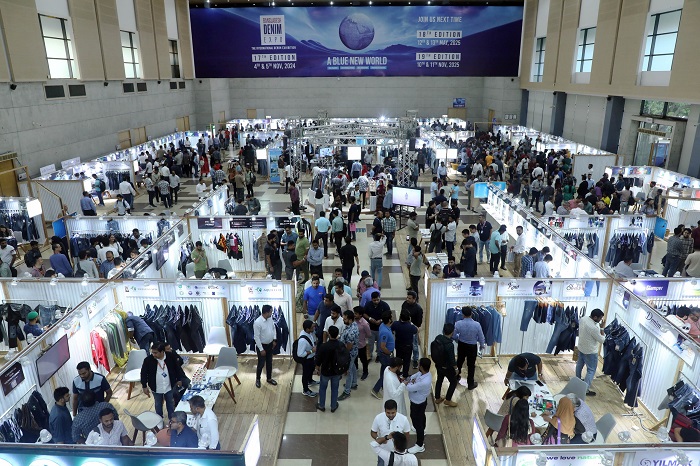
The 17th edition of the Bangladesh Denim Expo concluded successfully at Dhaka’s International Convention City, Bashundhara. Hosted by the Bangladesh Apparel Exchange (BAE), the two-day event drew over 5,543 attendees from 56 countries and featured 45 exhibitors from seven nations showcasing cutting-edge denim products, fabrics, accessories, chemicals, and production technologies. This year’s theme, ‘A Blue New World,’ underscored the importance of eco-friendly practices and responsible sourcing in Bangladesh’s journey toward sustainable innovation in fashion.
Driving sustainability in denim manufacturing
As Bangladesh moves toward sustainable fashion, the Expo provided a platform for industry leaders to discuss and embrace environmentally friendly practices. ‘A Blue New World’ highlighted the critical role of ethical responsibility and quality as Bangladesh strives to enhance its image in the global denim market. Exhibitors and participants were inspired to adopt practices that ensure the sustainability of both production and supply chains.
The event featured two influential panel discussions addressing Bangladesh’s path forward in the global ready-made garment (RMG) sector. The first panel focused on strategic actions necessary for Bangladesh’s RMG sector to transition from a low-cost production hub to a leader in sustainable, high-value apparel by 2030. Industry experts discussed the need for innovation, infrastructure upgrades, and a stronger emphasis on labor standards, all crucial for securing Bangladesh’s position in the global market.
The second panel discussion centered on Bangladesh’s anticipated graduation from its least developed country (LDC) status by 2029 and the critical need to maintain EU market access by adhering to GSP+ requirements. Panelists explored essential adaptations, with a focus on enhancing labor rights, improving environmental standards, and promoting transparency within the industry to ensure compliance and market competitiveness.
Expert insights on compliance, innovation, and labor rights
Throughout the event, experts from various fields shared insights on Bangladesh’s challenges and opportunities in the evolving apparel sector. M Riaz Hamidullah, Additional Foreign Secretary, highlighted the importance of labor rights, inclusion, and transparency in meeting global expectations. Mostafa Abid Khan from the Support for Sustainable Graduation Project emphasized the country’s reliance on the garment sector and noted the EU’s support if compliance standards are maintained. Edwin Koekkoek, representing the EU Delegation to Bangladesh, discussed the role of due diligence in promoting sustainability, with a focus on labor and environmental standards as well as decarbonization efforts.
Mohammad Sohel Sadat, Chairman of Shin Shin Group, stressed the need for continuous improvements in labor conditions and the importance of collaboration among customers, brands, and stakeholders to showcase social sustainability efforts in Bangladesh. Ole Rosenborg Justesen, Sector Counsellor from the Danish Embassy, highlighted the importance of investments in labor law, inspections, and supply chain infrastructure to improve working conditions in factories. Mustafizur Rahman, a Distinguished Fellow at CPD, urged brands and buyers to support local entrepreneurs through technology transfer and compliance enhancements, pointing out that compliance has become the new standard in the industry.
Shah Rayeed Chowdhury, Director at Evince Group, emphasized the importance of maintaining strong relationships with buyers and investing in team-building efforts to remain competitive. He highlighted the value of a ‘man behind the machine’ approach, which combines automation with human expertise to ensure sustainable business growth. Ziaur Rahman, Regional Manager at H&M, noted that while Bangladesh’s RMG sector has grown significantly over four decades, there is still work to be done to raise awareness about labor laws and due diligence standards among suppliers. He emphasized the need to build on foundational compliance practices.
A global meeting point for the denim industry
The Expo’s impressive turnout solidified its reputation as a key event for the global denim community, fostering collaboration and innovation. As Bangladesh aims to lead in sustainable, high-value apparel, the 17th Bangladesh Denim Expo has laid the groundwork for a brighter, greener future in fashion.
Often seen as eco-friendly alternatives to conventional plastics, bio-based materials may actually pose a greater risk to some key species than the plastics they are designed to replace, says a new study published in Environmental Science and Technology. Commonly found in textiles, clothing, wet wipes, and period products, these materials shed microfibers into the environment during laundering, the application of sewage sludge as fertilisers, and general wear and tea.
According to this study, in high concentrations, polyester fibers caused a 30 per cent mortality rate among earthworms after 72 hours, whereas bio-based fibers led to even higher death rates, with lyocell killing up to 60 per cent and viscose up to 80 per cent of earthworms. In another experiment simulating real-world fiber concentrations, soils containing viscose fibers hindered earthworm reproduction, while lyocell fibers led to reduced growth and greater burrowing activity.
Led by researchers from the University of Plymouth and the University of Bath as part of the Bio-Plastic-Risk project, this study emphasises the importance of extensive testing before the wide adoption of alternatives to plastics. Dr Winnie Courtene-Jones, Lead Author and Lecturer- Marine Pollution, Bangor University, emphasises, the study highlights the adverse effects of bio-based fibers on earthworms, which are critical to the environment’s functioning. It also emphasises on the importance of gathering further evidence before the adoption of various new alternatives to conventional plastics.
This research follows earlier findings published in 2024, which revealed that earthworms exposed to materials in biodegradable teabags experienced higher mortality rates and reproductive challenges.
Professor Richard Thompson, Head, International Marine Litter Research Unit, University of Plymouth notes, reducing plastic pollution requires not only recycling and re-use but also careful consideration of alternative materials. While addressing the plastic crisis, it is important to gather independent scientific evidence, he adds.
Global Sourcing Expo in Melbourne will spotlight strategies to reduce Scope 3 emissions, indirect emissions across the supply chain,which are critical to sustainability in the fashion industry. These emissions, comprising around 95 percent of apparel retailers' carbon footprint, have become a focal point as the industry confronts its environmental impact. Addressing these Scope 3 emissions is increasingly recognized as essential for meaningful progress toward sustainability.
The Expo's seminar series will feature a keynote by Liam Salter, Founder and CEO of Reset Carbon, a leading consultancy in carbon management. Salter, who has guided brands like Walmart, Nike, and Ralph Lauren through carbon-reduction initiatives, will deliver a session titled ‘Net Zero and scope 3 GHG emissions – How to get started and deliver results.’ This marks his first Australian speaking engagement, providing insights into practical decarbonisation strategies for the fashion sector.
Reset Carbon, headquartered in Hong Kong, operates across the Asia-Pacific region, assisting companies in creating comprehensive carbon-reduction frameworks. Its recent partnership with Beyond Sustainable Retail Group aims to bring these solutions to Australian and New Zealand retailers, with a strong focus on collaborative supplier engagement and sustainable practices.
Rick Lambell, CEO of Beyond Sustainable Retail Group, will moderate the session, offering his expertise in local retail sustainability efforts. The discussion will emphasize setting science-based targets, aligning procurement practices with emissions goals, and building strong supplier partnerships to achieve decarbonisation.
The seminar will be held on November 21. For fashion and textile businesses committed to significant climate action, this session provides a roadmap to effectively tackle Scope 3 emissions and advance towards Net Zero targets.



